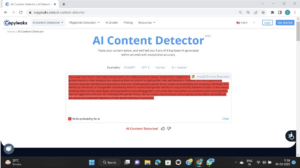Essays are an integral part of the college application process. They give admissions officers a glimpse into your achievements and aspirations beyond grades and scores. Due to their importance, it is not surprising that students constantly search for ways to simplify the writing process.
Recently, ChatGPT, an artificial intelligence (AI) writing tool developed by OpenAI, has taken the world by storm. It uses deep learning techniques to generate content based on the input data and can perform various language-related tasks, including text completion, text generation, question answering and summarisation.
While much ink has been spilt on its benefits, how reliable are ChatGPT and other AI essay generators for your college application, and should you rely on them for such a crucial, life-altering task?
Here are 5 reasons you should not use ChatGPT or any other AI-writing generator for your college application essays:
1) AI-writing is detectable:
In The Fellowship of the Ring, J.R.R. Tolkien wrote, “Shortcuts make long delays”, and he was right. While ChatGPT may be the most sophisticated AI essay generator, several tools can identify artificial intelligence writing. Expect universities to develop and implement more sophisticated tools to see whether you’ve used AI to write your essay. We tested a free AI-writing detection tool online by adding ChatGPT-generated content. Look at the results:

If a free tool can be this accurate, imagine what an AI detector specially developed for essays will do. Should the college detect artificial writing in your essay, it may terminate your application. Or worse, you could face penalties for cheating. These consequences could delay you from achieving your goals.
2) ChatGPT and AI-writing lack creativity and insight:
Creativity and insight are the hallmark of a good college application essay and can only come from your experiences. ChatGPT, at the end of the day, offers AI-generated content, which merely regurgitates what everyone talks about without providing depth or creativity.
Our CEO and Co-founder, Dr. Kimberly Dixit, says, “Essays give admissions officers a glimpse into your personality. They are looking for thoughtful, insightful young adults. Essays generated by AI-writing tools like ChatGPT are generic and lack insights. AI-essay writing makes you sound exactly like everyone else and kills your competitive edge.”
We tested ChatGPT by asking it to write about the most significant challenge that society faces today in 50-60 words.
Here’s ChatGPT’s response:
The most significant challenge society faces today is the increasing inequality and division in many aspects, such as income, race, ethnicity, and political views. This inequality and division can lead to social and political instability, hindering progress and cooperation towards addressing other important global issues such as climate change and pandemics.
The problem with this response is that it’s cliched and overly sanitised. While you can’t escape topics like climate change, inequality or impending pandemics, you need to pick one of these subjects and write about them in an unexpected way.
Here’s what is expected in your essay:
We all know this shape-shifting monster. At first, it was small, unassuming and barely noticeable in life’s grand scheme. But it has morphed into a dangerous and unpredictable force, threatening mankind’s existence. Let me introduce you to the one thing that scares me the most — Climate Change!
The version written by a human is creative and gives the reader a glimpse into how much climate change frightens the writer. This personal perspective makes the writing unique and sets you apart from others who have selected the same prompt.
3) ChatGPT and AI-generated content is verbose:
The basic rule for strong academic writing is to say everything relevant in as few words as possible, which means your essay should not be too wordy.
But a research paper published titled, How Close is ChatGPT to Human Experts? Comparison Corpus, Evaluation, and Detection revealed that ChatGPT writes in a long-winding way.
Our President, Namita Mehta, says, “Usually, you are expected to convince admissions officers why they should consider you within 300-600 words (sometimes less). Therefore, concise writing can go a long way. It can help you reveal more about yourself within the limited word count. However, ChatGPT-generated content is extremely wordy and repetitious, which comes across as though you have nothing specific to say”.
We tested ChatGPT by asking it to describe a concept it finds engaging within 100 words.
Here’s the ChatGPT response:
The concept that captivates me the most is the human brain and its vast potential for learning, problem-solving, and creativity. The idea that the three pounds of matter inside our heads control our thoughts, emotions, and actions is simply mind-blowing. The complexity of the brain and the mysteries surrounding its functioning never cease to amaze me, and I find myself constantly diving deeper into its inner workings. What makes the study of the brain so engaging is the fact that it has real-life applications and can help us better understand ourselves and others. From mental disorders to the impact of various environmental factors on brain development, the potential for discovery is vast.
The AI-writing generated by ChatGPT has unnecessary words and repetition of thought.
Here’s what is expected in your essay:
The human brain’s capacity for learning, problem-solving, and creativity fascinates me. Its complexity and mysteries of thought, emotion and action never fail to amaze. Some day my investigations of the brain will help me solve real-life issues like mental disorders and the impact of environmental factors on brain development.
Remember that verbose essays don’t impress admissions officers but go against you. So, think twice before using ChatGPT or any other AI-writing generator for your college application essays.
4) ChatGPT and AI essay-writing is not reflective:
Several college application essays require you to write reflectively. To do so, you must introspect, examine your life’s experiences, describe your feelings and thoughts, analyse their impact and reveal what you’ve learnt. Moreover, they must reflect your voice, sense of humour, and natural way of speaking. An essay generated by a machine is unlikely to meet those expectations. Furthermore, it uses a template that will make your essay sound artificial.
Mehnaz Jaffer, Head of Undergraduate Admissions, says, “Think of your essays as stories that shed light on experiences that shaped you. Self-reflection is important because it will help you convey emotions and thoughts. ChatGPT and other artificial intelligence essay generators don’t understand feelings, nor can they reflect for you.”
We tested ChatGPT by asking it to write about dealing with a parent’s health crisis as a high school kid within 120 words.
Here’s the ChatGPT response:
Dealing with my parent’s health crisis as a high school kid was a rollercoaster of emotions. It was tough to keep up with my studies while worrying about my parent’s well-being. I had to step up and take on more responsibilities at home, which was a struggle to balance schoolwork and extracurricular activities. I leaned on my friends and family for support, and their encouragement helped me stay positive. It was also important for me to stay informed about my parent’s health, so I attended doctor’s appointments and researched their illness. Although it was a difficult time, I learned the value of resilience, perseverance, and the importance of cherishing our time with loved ones.
One look at the ChatGPT content and a trained eye can detect that it is artificially generated. It is not experiential and doesn’t allow the reader to feel the writer’s emotions.
Here’s what is expected in your essay:
Tears streamed down my face. Sirens blared, but the silent panic in my head was deafening. As a fourteen-year-old, I was distraught over the thought of losing my only parent. During her three-hour surgery, I reflected on my mother’s positive outlook and drew strength from it, despite the doctors telling me that there were complications. When high school started, everyone thought the crisis was over, but it had just started to impact my life. My mother was often fatigued, so I assumed more responsibility, juggling family duties, school, athletics, and work. But each day was a stage in my gradual transformation from dependence to relative independence.
The improved version written by a human tells a story. It intelligently uses language to put the reader in the writer’s shoes.
5) ChatGPT and AI-writing tools don’t understand the motive behind an essay prompt:
All college application essay prompts have a clear motive. As an applicant, you must understand the reason for the prompt. For example, if the prompt asks you to write about overcoming challenges, admissions officers want to see if you have the grit to face them and whether you have created an impact.
Tripti Singh, Education Counsellor and our Head of Postgraduate Admissions, says, “Language is complex and open to interpretation. At the end of the day, ChatGPT is an artificial intelligence writing programme that relies on algorithms to understand language. It can miss the point of the prompt entirely.”
Our Head of MBA Admissions, Preeti Wadekar, added to that by saying, “Essay prompts elicit specific information. In most cases, the motive is unsaid and meant to be perceived. ChatGPT doesn’t know how to read between the lines.”
We tested ChatGPT by asking it to write about overcoming dyscalculia within 150-200 words.
Here’s the ChatGPT response:
Growing up, I struggled with dyscalculia which made it difficult to keep up with my classmates. This resulted in poor grades and a lack of confidence in my abilities. But I spent countless hours studying and gradually started to see improvement in my grades and confidence. Furthermore, my family struggled to make ends meet, and I often had to work part-time jobs to help support us. I never let these hardships get in the way of my education. I stayed focused on my goals and remained determined to succeed. My challenges taught me the importance of perseverance, determination, and a positive attitude.
The ChatGPT write-up misses the motive of the question entirely. It simply highlights the problem, doesn’t show the struggle and doesn’t reveal the impact.
Here’s what is expected in your essay:
“If x+y = 12 and xy= 35, what numbers are x and y?” As I stared at this question in my algebra paper, the figures began to dance. 12 changed to 21, and 35 looked like 53, and they wouldn’t stop moving. Anxiety swept over me. I knew I would fail my math exam for the umpteenth time. But little did I know that I had a learning disability called dyscalculia. I’d often make self-deprecating jokes about my incompetence. But in truth, it was a cover-up for feeling less smarter than my classmates. When the school recognised my disability, they put me in a special class where the teacher used pictures and songs to teach math. I have to admit, at first, it was humiliating. I wasn’t a six-year-old. But I attended those classes diligently, and my grades improved drastically within a year. To help parents identify this debilitating disability, I started an awareness campaign, which was picked up by the local news. Not only have I overcome my challenges, but I’ve made it my mission to help others too.
In the revised content, you can feel the writer’s embarrassment of a disability, the struggle, the grit to overcome it and make a difference.
So, as tempting as it may seem, ChatGPT, or for that matter, any AI-writing essay generator for your university application essays is not a good idea.
Whether it’s the Common App Essay, the Columbia Business School MBA Essay or a Statement of Purpose for your master’s application, remember to write it yourself. If you need any help, from selecting a prompt to editing it to perfection, please get in touch with us. Our essay specialists look forward to working with you.




